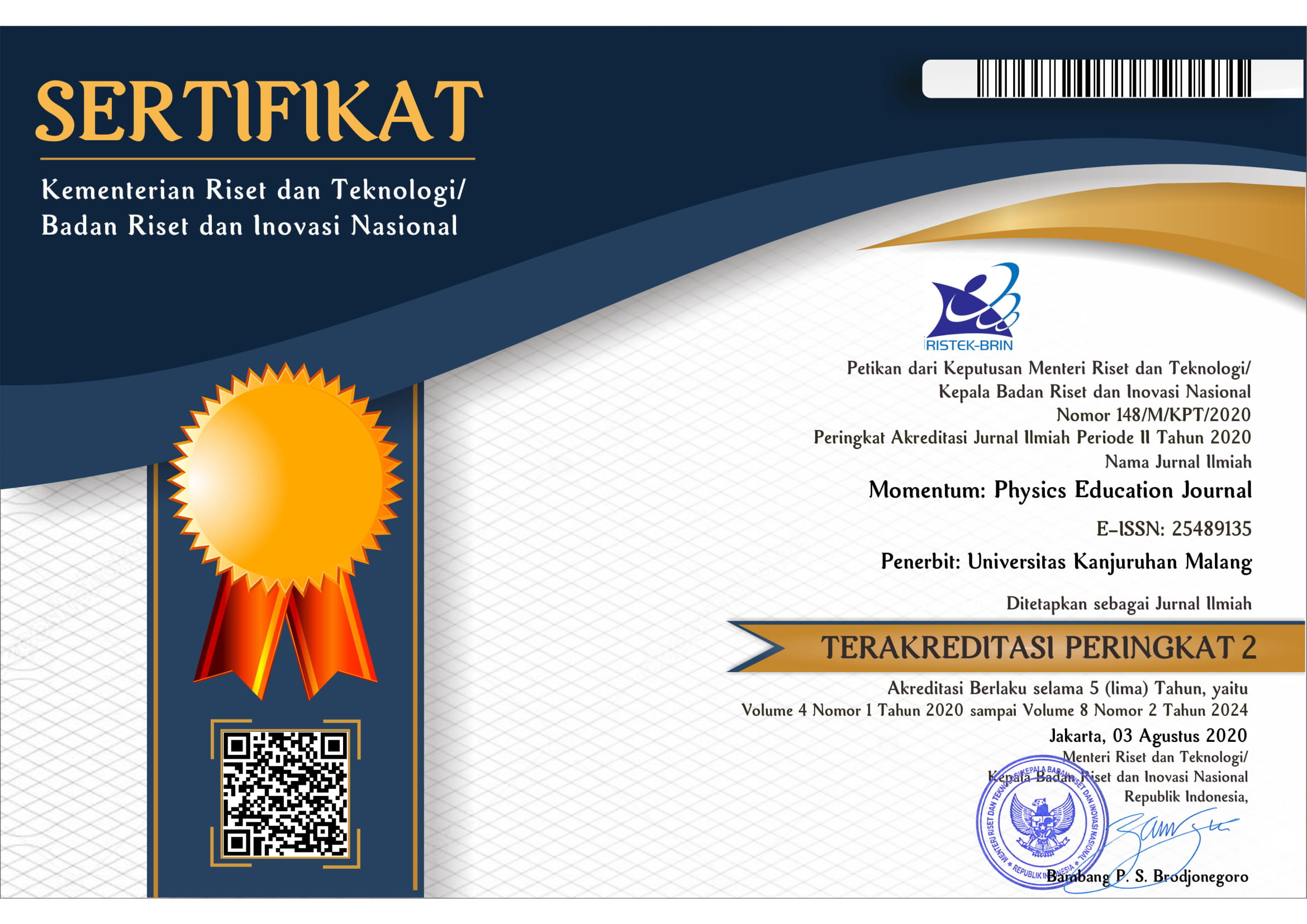Rasch modeling: Developing a critical thinking ability test for students on climate change material
DOI:
https://doi.org/10.21067/mpej.v7i2.8310Keywords:
rasch modelling, critical thinking skills, climate changeAbstract
The goal of this study was to examine critical thinking skills on the topic of climate change. This study is quantitative in nature. The information was gathered by creating a 30-question test to assess the ability to think critically about climate change. Respondents were 52 physics education students from one of Tasikmalaya's campuses. Winstep software version 4.00 was utilized for data analysis. Rasch modeling was employed in this investigation. The results of the Rasch modeling study show a value of 0.38 for person reliability and 0.91 for item reliability, indicating that the instrument items manufactured are dependable. The raw variance value of 23.4% suggests that the standards for dichotomous data construct validity are met. The separation value of 3.15 supports this. It suggests that this item has a good answer distribution and can assess critical thinking skills on the topic of climate change. As a result, it can be used for study.
Downloads
References
A. Leicht, J. H. & W. J. B. (eds). (2018). Issues and trends in Education for Sustainable Development Issues and trends in Education. UNESCO Publishing.
Alnajdi, S. M. (2018). The Effectiveness of Designing and Using a Practical Interactive Lesson Based on ADDIE Model to Enhance Students’ Learning Performances in University of Tabuk. Journal of Education and Learning, 7(6), 212–221.
Andresen, L., Boud, D., & Cohen, R. (2020). Experience-based learning. In Understanding Adult Education and Training (pp. 225–239). Allen&Unwin. https://doi.org/10.4324/9781003118299-22
Asysyifa, D. S., WİLUJENG, İ., & Kuswanto, H. (2019). Analysis of students critical thinking skills using partial credit models (Pcm) in physics learning. International Journal of Educational Research Review, 4(2), 245–253.
Chusni, M. M., & Suherman, S. (2021). Developing authentic assessment instrument based on multiple representations to measure students ’ critical thinking skills. Momentum: Physics Education Journal, 5(23), 194–208. https://doi.org/https://doi.org/10.21067/mpej.v5i2.5790
Eggert, S., Nitsch, A., Boone, W. J., Nückles, M., & Bögeholz, S. (2017). Supporting students’ learning and socioscientific reasoning about climate change-the effect of computer-based concept mapping scaffolds. Research in Science Education, 47, 137–159.
Eleje, L. I., Onah, F. E., & Abanobi, C. C. (2018). Comparative Study of Classical Test Theory and Item Response Theory Using Diagnostic Quantitative Economics Skill Test Item Analysis Results. European Journal of Educational & Social Sciences, 3(1).
Ennis, R. (2011). Inquiry: Critical Thinking Across the Disciplines (Vol. 26, Issue 1). Philosophy Documentation Center.
Ennis, R. H. (2011). Critical Thinking: Reflection and Perspective Part I. Inquiry: Critical Thinking Across the Disciplines, 26, 4–18.
Facione, P. (2015). Critical Thinking: What It Is and Why It Counts. Insight Assessment.
Frijters, S., ten Dam, G., & Rijlaarsdam, G. (2008). Effects of dialogic learning on value-loaded critical thinking. In Learning and Instruction (Vol. 18, pp. 66–82). Elsevier Science. https://doi.org/10.1016/j.learninstruc.2006.11.001
Hudha, M. N., Batlolona, J. R., & others. (2017). How are the physics critical thinking skills of the students taught by using inquiry-discovery through empirical and theorethical overview? Eurasia Journal of Mathematics, Science and Technology Education, 14(2), 691–697.
Maryani, I., Prasetyo, Z. K., Wilujeng, I., Purwanti, S., & Fitrianawati, M. (2021). HOTs Multiple Choice and Essay Questions: A Validated Instrument to Measure Higher-Order Thinking Skills of Prospective Teachers. Journal of Turkish Science Education, 18(4), 674–690.
Masson-Delmotte, V., Zhai, P., Pirani, A., Connors, S. L., Péan, C., Berger, S., Caud, N., Chen, Y., Goldfarb, L., & Gomis, M. I. (2021). Climate change 2021: the physical science basis. Contribution of Working Group I to the Sixth Assessment Report of the Intergovernmental Panel on Climate Change, 2.
NSTA. (2020). Standards for Science Teacher Preparation. 3–6.
Palavan, Ö. (2020). The Effect of Critical Thinking Education on the Critical Thinking Skills and the Critical Thinking Dispositions of Preservice Teachers. Educational Research and Reviews, 15(10), 606–627.
Rachmadtullah, R. (2020). Critical Thinking Instrument Test (CTIT): Developing and analyzing Sundanese students’ critical thinking skills on physics concepts using Rasch analysis. International Journal of Psychosocial Rehabilitation, 24(08).
Ridwan, I. M., Kaniawati, I., Suhandi, A., Samsudin, A., & Rizal, R. (2021). Level of sustainability awareness: where are the students’ positions? Journal of Physics: Conference Series, 1806(1), 12135. https://doi.org/10.1088/1742-6596/1806/1/012135
Saprudin. (2019). ω omega The Potential of Gamification in Developing Pre-Service Physics Teachers ’ Critical and Creative Thinking Skills. 2318. https://doi.org/10.31758/OmegaJPhysPhysEduc.v5i1.7
Sharkness, J., & DeAngelo, L. (2011). Measuring Student Involvement: A Comparison of Classical Test Theory and Item Response Theory in the Construction of Scales from Student Surveys. Research in Higher Education, 52(5), 480–507. https://doi.org/10.1007/s11162-010-9202-3
Shaw, A., Liu, O. L., Gu, L., Kardonova, E., Chirikov, I., Li, G., Hu, S., Yu, N., Ma, L., Guo, F., Su, Q., Shi, J., Shi, H., & Loyalka, P. (2020). Thinking critically about critical thinking: validating the Russian HEIghten® critical thinking assessment. Studies in Higher Education, 45(9), 1933–1948. https://doi.org/10.1080/03075079.2019.1672640
Suhendi, H. Y., Ramdhani, M. A., & Irwansyah, F. S. (2018). Verification concept of assesment for physics education student learning outcome. Int. J. Eng. Technol., 7(3.21), 321–325.
Sumintono, B., & Widhiarso, W. (2015). Aplikasi Pemodelan Rasch: pada Assessment Pendidikan (I). Trim Komunikata.
UNESCO. (2017). UNESCO moving forward the 2030 Agenda for Sustainable Development.
UNESCO. (2020). Education for Sustainable Development A Roadmap. In Impact (Vol. 2009, Issue 18). UNESCO Publishing. https://doi.org/10.1111/j.2048-416x.2009.tb00140.x
von Weizsäcker, E.-U., & Wijkman, A. (2018). Come On! Capitalism, short-termism, population and the destruction of the planet: A report to the club of Rome. Springer Science+Business Media LLC.
Zhang, X., Tang, Q., Liu, X., Leng, G., & Di, C. (2018). Nonlinearity of runoff response to global mean temperature change over major global river basins. Geophysical Research Letters, 45(12), 6109–6116.
Downloads
Published
How to Cite
Issue
Section
License
Copyright (c) 2023 Momentum: Physics Education Journal

This work is licensed under a Creative Commons Attribution-ShareAlike 4.0 International License.


.png)
.png)
.png)
.png)




